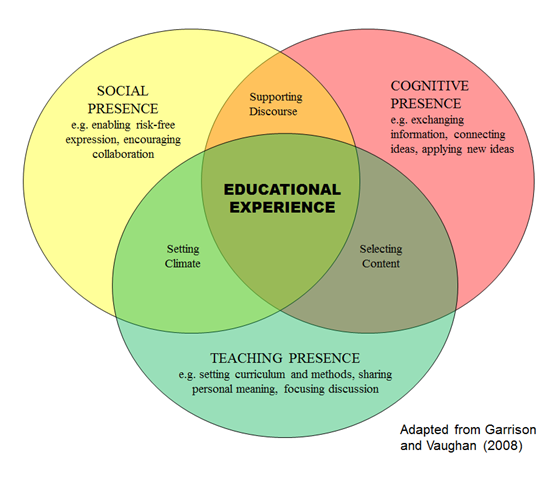[Update: I got a bit off topic in Ramiro’s collaboration, my original post for week two. This is more specific to our own community-I welcome any comments:)]

Ever been in a lecture and somebody asks a question or make a comment that makes you think about the subject in a totally new way? Or it confirms an opinion or understanding that was already forming in your mind? It happens to me often. Some of the moments I most enjoy in a class take place when the lecturer sparks debate and conversation regarding a topic. I find it is easy in a traditional lecture (for me at least) to develop a type of learning tunnel vision. It is through listening to others’ opinions and experiences that one is able to see a different perspective and gain further understanding.
I found the concept of the CoI (community of inquiry) to be quite an absorbing one. I have always been more of a kinesthetic learner so for me the concept of a collaboration between the social, cognitive and teaching presences naturally makes sense. By presenting the material and creating a platform to discuss it, the lecturer leads the session, facilitating triggering events through respectful discourse and conversation within the safe community environment. This allows the students ( and hopefully at times the lecturer) to construct and derive more meaning than would other ways be possible through introspective reflection.
My natural instinct when moving within a community is firstly to engage with others through establishing points of reference. I look for the similarities, instead of focusing on the differences. It’s so easy to fall in the trap of ‘the other’, and to place oneself in a superior position. By doing this we unwittingly build walls around ourselves. Other people will always have a different perspective on topics, which is created through their own experience. I like to listen and learn. When it comes to our community of inquiry I would like to have the profile of someone that contributes and participates in the inquiry process. This should always take place while observing the social emotional environment and sensitivity within a group.
As professionals, I think we primarily should build bridges between the community and information, thereby helping in the process of creating what I might term an ‘evidence based practice’ society. My challenges in this? I must admit I’m an assertive individual with strong opinions-if you get into a political debate with me you will know it can quickly take on the shape of sparring. This is a natural tendency for most people but nevertheless an instinct that as a professional I will need to moderate. As long as there is respectful interchange we are there to enable the sharing of knowledge.
I believe this post incorporates the elements and characteristics I should display this semester. We should ask questions, inquire, be thoughtful of one another and respectful to each other. It is an interesting exercise to be rewriting this post in week 5, as I feel I have a bit more of an understanding for what the community of inquiry is, particularly after the first Twitter chat. I look forward to more.
You’ve made some great points there, and some good advice. I agree that its important to remember that on any topic there’s always someone who is going to see it another way, and that we should find the common ground first instead of having tunnel vision for the differences.
LikeLiked by 1 person